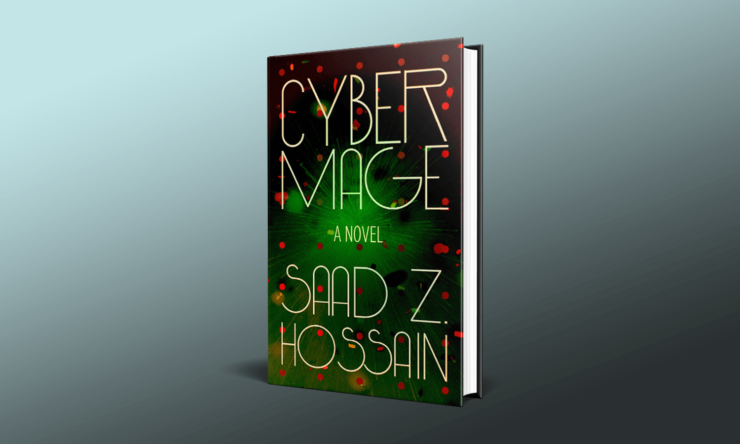In 2089, Dhaka, Bangladesh has found an unexpected way to not just survive a global climate apocalypse…
We’re thrilled to share an excerpt from Saad Z. Hossain’s Cyber Mage, a genre mashup of SF and fantasy that offers a scathing critique of corporate greed—available December 7th from Unnamed Press.
Welcome to Dhaka, Bangladesh in 2089. A city notorious for its extreme population density has found an unexpected way to not just survive a global climate apocalypse, but thrive: pump enough biological nanotech into the neighborhood and all of the bodies together form a self-sustaining, and even temperate, microclimate. Of course, this means that millions of humans have to stay put in order to maintain a livable temperature, and people are getting restless. All of the nanotech has also led to some surprises: certain people no longer need food or water while others can live without functioning organs.
So the mercenary Djibrel has to carry a machete wherever he goes. Only a swift beheading can ensure the job gets done anymore. Djibrel navigates the crowded streets, humans teeming with genetic mutations, looking for answers about what happened to the Djinn, a magical super race of genies who seem to have disappeared, or merged, with humans for survival. What Djibrel doesn’t know is that his every move is being tracked by the infamous Cyber Mage—better known to his parents as Murzak, a privileged snarky teenager who regularly works for a Russian crime syndicate with a band of elite hackers, like his best friend ReGi, who resides in North Africa’s FEZ (Free Economic Zone). Respected and feared online, Murzak is about to embark on one of his biggest challenges: attending high school IRL. But when he discovers a brand new type of AI, operating on a dark web from the abandoned Kingdom of Bahrain that he thought was just an urban myth, Murzak and Djibrel will have to face the unimaginable in an already inconceivable world.
Akramon Djibrel didn’t take prisoners. He took heads. Born into severely debilitating circumstances, just at the cusp of the great floods and fires, the so-called Disintegration Era, Djibrel had pretty much had to fend off all comers, including sexual predators, robbers, kidnappers, serial killers, organ hunters, and even cannibals. Also there were welfare workers, tree huggers, state services, religious orphanages, and other molesters of the idealistic variety.
His response to all transgressions had always been furious attack. In him was some long-dormant berserker gene that transformed his small, wiry childhood frame into a spitting, biting, hacking dervish who seemed to hate every living thing. He had grown since then into an apex predator, honed by the pressures of the rabble. Crime was unregulated among the cardless, the great sea of people who surrounded the city, and armed men and women made their own laws like the sheriffs of old. There were mech suits, powered armor straight from the pages of anime. There were drone halos controlled by the mind, exotic tech marbles that could tear through flesh like paper. Finally, there were swords.
Djibrel had a talwar—a singular weapon. It was single-edged, with a six-degree curve in the blade. The hilt had a simple cross guard with a knuckle bow, a small band of metal that protected the fingers from getting chopped off. The pommel was a flanged disk sporting a four-inch spike, useful for punching people in the face in close quarters. A hole in the pommel allowed a leather thong to be attached to the wrist, preventing loss of the weapon during moments of stress. In Djibrel’s line of work there were always moments of stress.
Buy the Book


Cyber Mage
It looked like a relic of the Mughal era, a weapon reminiscent of the sabers used by the Turkic horse peoples of Central Asia, closely related to the Persian shamsher, the Turkish kilij, and the Afghan pulwar. The great Mughal Babur, most famed of conquerors, might well have worn this weapon on his belt. The sword bore no maker’s mark. There was no scrollwork or jewel in the hilt, no mother of pearl on the scabbard, but the blade itself conveyed its pedigree, the peculiar watery mark of Wootz steel, the priceless rose-and-ladder pattern etched in metal that purveyors of weapons all through the Middle Ages knew as Damascene.
If, in fact, this were a genuine Wootz steel blade from the Middle Ages, it would have belonged in a museum or in the hands of some avid collector, easily worth more than Djibrel’s entire life’s income, more, in fact, than the entire GDP of the slum he hailed from.
The blade was sharpened to a monomolecular edge, which was translucent, so that the very hairsbreadth of the cutting side was invisible. Edges this sharp had hitherto been possible only in obsidian blades, but those tended to be brittle and shatter easily. The makers of this blade had done something to ensure that the edge self-repaired to some extent, and moreover maintained an unlikely toughness, thus ensuring that the weapon did not face ruin after the first cut.
The sword was used, almost exclusively, for cutting off heads. Cutting off heads was necessary in the slums due to the rampant nanotech available. Bullets didn’t kill people with the same finality they used to. In the Mirpur area, where Djibrel currently roamed, there were continuous twenty-story habitations that created one great longhouse, with passages through, and tunnels, and other covered roads high and low; these passages were also rented out to the needy, so actual traversable pathways mutated according to daily or weekly lease agreements. The roads on the ground, long-ago municipal routes of durable concrete, had been claimed for living space, filled up with lean-tos, tents, and steel structures. The roofs often boasted illegal kitchen gardens, rapidly evolving plants living in symbiosis with the nanite-infected air. Everything was mutable, for a plethora of cheap 3-D printers were available and enough expertise existed here to create any number of unlikely structures, most of them composed of dubious raw materials, some of them entirely from raw sewage, so that the term “living in a shit house” was made literal.
There was a grand, snakelike bazaar, where trade was untaxed and free, as long as you had the muscle to back it up. The Mirpur zone was a quarantined area, meaning the three million people squeezed into it were not legally allowed to leave. They had once been the citizens of the country known as Bangladesh, but the whole nature of nationhood had changed, splintered down into fiefdoms effectively ruled by private city corporations. They were now allegedly citizens of the Dhaka City Corporation, some of them with single shares in either the DCC or Mirpur Inc., with the accompanying privileges. Many had no shares, however, and these were effectively nonpeople, though still essential for population density, which is why the city fed them and let them stay inside the borders.
Much of the city was like this, outside of the privileged enclaves like Dhanmondi or the Tri-State, which protected their exclusivity with maximum force. Of course, the Tri-State was incorporated and anyone living within had shareholder status—actual valuable shares. This meant they counted. As actual people. They had equity in the world.
“Force” was really the key word everywhere in Bangladesh, but pretty much definitively in Dhaka City. Many do-gooders were attracted to this region to observe firsthand the massive concentration of 30 million people in an area the size of a postage stamp, and once in Dhaka, astonished by the sheer scale of inhumanity, they often sat paralyzed with confusion and mounting dread. A few of them tried to help, which was even worse.
Many such cases of help included the use of illegal health-grade nanotech. Ingested in water, in food, dispersed into the air—Mirpur had been dosed liberally, as had most other zones. Many of the tech caused cancer, disfigurement, often hideous death. Still, it made bodies invulnerable: to disease, to injury, to starvation even. There were some people in Mirpur who could survive on water puddles and air, thanks to nanotech in their bodies working miracles. There were other people who could survive otherwise-fatal gunshot wounds, because nanotech in their bodies knit up severed arteries, repaired heart or brain tissue in seconds. There was no one, however, who survived having their head cut off.
Djibrel stalked through Mirpur number 10, passing through the road-bazaar, where he was somewhat known and generally avoided. He had a sword, and he had his shotgun, and he had his general bad attitude. He didn’t take taxes like street thugs were wont to do, nor did he belong to any of the various criminal gangs that ruled this space. He preyed on them sometimes, but almost whimsically. There was a general consensus that he wasn’t quite right in the head, and was best left alone.
When he reached the old zoo, which now housed several hundred thousand people, Djibrel found a purveyor of hybrid parrots. The selling of live animals was a class 1 offense in the DCC. The dealer owed him from some previous avian crisis, and erased this debt with few terse directions.
The man Djibrel had come to kill was hiding in a third-class government workers’ colony, just a few hundred meters from the zoo. It was good housing of sorts: ventilated, stormproof, with solar and water, solidly in the green zone for air security.
He had a bounty on his head, this third-class government worker, set by some lord in Gulshan, but this was not why Djibrel came for him. It was said that he did black magic, this kobiraj, this witch doctor, but that wasn’t the reason either. Mullah. Kobiraj. Religious by day, witch by night. The djinn network was like a great cancerous tree, and shaking it enough would eventually get him what he wanted.
“Careful now,” the dealer told him in passing. “The witch knows you’re coming.”
“Me specifically?” Djibrel frowned. Someone must have been gossiping.
“Dude. You’re a guy walking around with a sword and a stack of heads. Of course he knows you’re coming.”
Djibrel kicked on.
Excerpted from Cyber Mage, copyright © 2021 by Saad Z. Hossain.










